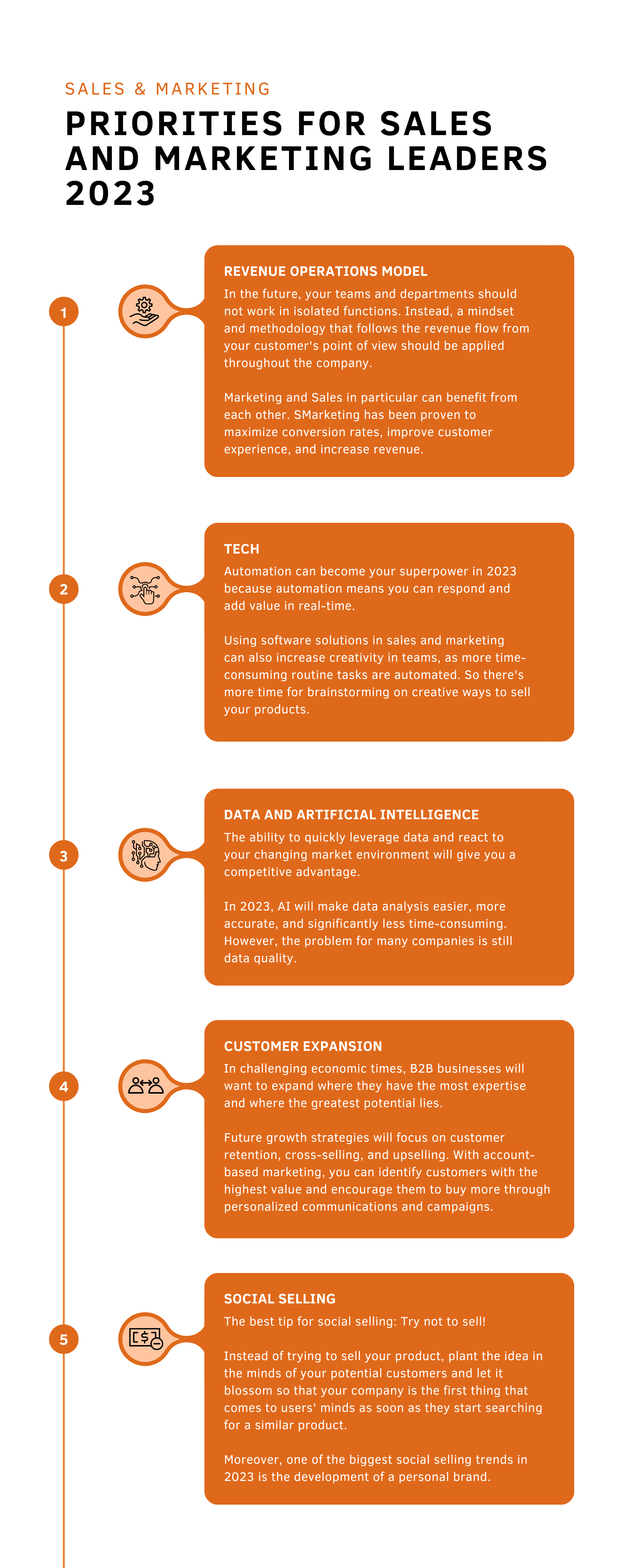2. Tech in Sales and Marketing
In 2023, automation can be your superpower when it comes to managing customer information and interactions. By automating processes, you can respond and add value in real-time to multiple buyers who have different needs, making your business more efficient and effective. Furthermore, using software solutions in sales and marketing can also increase creativity in teams by freeing up time previously spent on routine tasks. This allows for more time and energy to be dedicated to brainstorming creative ways to sell your products. For example, sales videos are a trend in 2023 that your sales team can implement to great effect. Companies that have introduced video into their sales process have been able to cut their sales cycle in half4.
Despite the many benefits of automation, some teams may still be holding back. The 2022 CMO Survey3 found that only 54.1% of marketing teams have the knowledge and experience necessary to effectively use the systems and tools available. However, by investing in training and education for your team, you can unlock the full potential of automation and make it a valuable asset for your business.
3. Big Data and artificial intelligence for reliable sales forecasts
However, the challenge of efficient and effective use of tools and software is not just limited to the skills of your teams. According to the LinkedIn Global State of Sales Report5, incomplete data is the biggest challenge for almost half (46%) of salespeople. Moreover, only 30% of sales leaders surveyed by Korn Ferry2 believe that their companies have a clear data strategy. Without a clear data strategy and complete data, it can be difficult to leverage data quickly and react to the market environment, which can result in a lost competitive advantage.
Fortunately, in 2023, data analysis is becoming easier, more accurate, and significantly less time-consuming thanks to the widespread adoption of artificial intelligence in sales analytics. AI-powered sales forecasting software can deliver greater accuracy and help mitigate risks. However, many companies still struggle with incomplete or poorly stored data, which can hinder their ability to leverage AI-powered analytics. Therefore, having a clear data strategy and a system for data storage and management will be crucial in gaining a competitive edge in 2023.
4. Customer expansion becomes increasingly important
In today's highly competitive market, retaining customers is more important than ever. By focusing on customer retention, cross-selling, and upselling, B2B businesses can increase their revenue and profitability in a cost-effective manner. As the economy remains uncertain, resource-intensive customer acquisition will take a back seat in 2023 as businesses double down on their existing customer base.
One highly effective strategy for maximizing the value of existing customers is account-based marketing. By identifying the highest-value customers and creating personalized communication and campaigns, businesses can encourage additional purchases and strengthen relationships. This approach enables sales teams to bundle products and services, thereby boosting return on investment and creating more value for customers.
To execute an effective account-based marketing strategy, businesses must have a deep understanding of their customers and their needs. This requires collecting and analyzing data, as well as developing customized content and campaigns that resonate with each customer segment. By leveraging technology and automation, businesses can streamline these processes and make them more efficient, freeing up resources to focus on delivering exceptional customer experiences.
5. Social selling is a must in 2023!
In 2023, the human touch will be more important than ever in sales and marketing, despite the increased automation opportunities available. Social selling, in particular, will become essential for companies looking to remain competitive. While having a company profile on social media is a start, it's crucial to have a well-planned and executed social selling strategy to avoid causing more harm than good to your sales.
The best way to approach social selling is to avoid the hard sell and instead focus on planting the idea of your product or service in the minds of potential customers. By answering their questions and showcasing your expertise, you can position your business as the go-to solution for their needs.
In 2023, one of the biggest social selling trends will be the development of personal brands. CEOs, managers, and other representatives of your company should position themselves as experts on social media platforms, especially LinkedIn. By capturing the attention of your target audience, gaining their trust, and organically drawing their attention to your offering, you can establish a strong personal brand that adds value to your company's overall brand.
The bottom line is that 2023 can only be a successful year if your teams have the right skills!
In 2023, the key to successful sales initiatives is the combination of technology and customer-centricity. With an uncertain economic environment, sales decisions must be based on data-driven insights. To achieve this, your team must develop a habit of regularly updating CRM systems and producing sales reports to identify opportunities and avoid wasting time and resources.
As the majority of B2B buyers are tech-savvy millennials and Gen Z, it's essential to redefine the role of the sales rep to align with the digital customer journey. Sales reps must develop appropriate technical skills and provide a more consultative approach to understand the unique challenges of each customer's business and offer solutions that deliver desired outcomes.
In addition, coaching and employee development should focus on developing soft skills such as communication, empathy, and problem-solving to meet the evolving expectations of buyers. By prioritizing both technical and soft skills, sales teams can create a more personalized and engaging customer experience, which can lead to improved customer retention and revenue growth.



